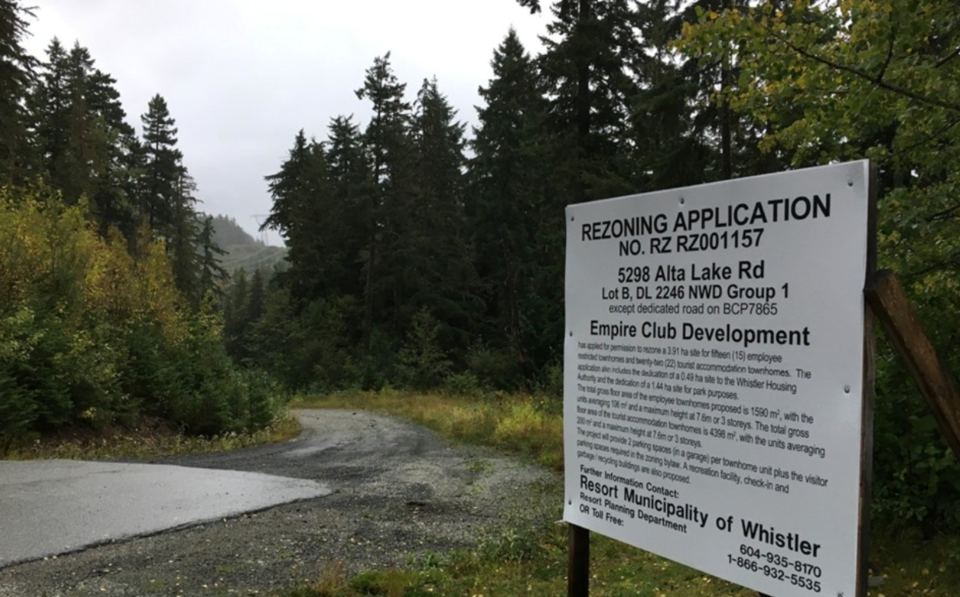Whistlerites got a second chance to have their say on a polarizing housing project proposed for the shores of Nita Lake last week, and if the small-but-vocal group in attendance was any indication, public opinion of the development remains overwhelmingly opposed.
A public hearing for the mixed-use development proposed for 5298 Alta Lake Road was first held in March 2021, but due to a procedural oversight that meant Resort Municipality of Whistler (RMOW) staff did not consult with School District 48 in time as it was statutorily obligated to do, a second public hearing was triggered.
Held digitally last Wednesday, April 6, 11 different members of the public spoke at the hearing, and while the original hearing last year appeared to be more evenly divided, that was not the case last week, with each public attendee voicing their opposition.
The project has garnered swift and significant backlash almost from the moment it was proposed, and has been amended multiple times to better accommodate both staff and residents’ concerns. If approved, the development would add 21 employee-restricted units, 11 tourist-accommodation units and 11 market residential units to a 1.93-hectare parcel. That compares to the 15 employee-restricted units (eight of which were to be maintained by the proponent) and 22 market tourist-accommodation units originally proposed.
Criticisms of the project have remained fairly consistent throughout the years-long rezoning process, with opponents taking particular issue with its density, and its potential impacts to the lakefront ecosystem and traffic along Alta Lake Road. But what has been perhaps the most persistent issue among opponents is a belief that the proponent, the Michael Hutchison-led Empire Club Development Corp., is not offering enough benefit to the community for what it’s getting in return.
“My greatest concern with the whole project is the [private employee housing] guidelines have been … abandoned,” said Garry Watson, a former RMOW councillor who is widely considered a forefather of modern Whistler. “There’s been no reference back to the guidelines, that is the guidelines that were to optimize the amount of employee housing within this proposed development and allow for only a limited amount of new unrestricted market accommodation to support the project viability.”
Watson told council he had come up with his own formula that would set the number of market units at 15, eliminate the tourist-accommodation units entirely, and increase employee units “by up to 30 units”—in light of the fact the proposed restricted units are a fraction of the size of the market units—while still producing “amazing, amazing profits” for the proponent.
Others reiterated the need to preserve Whistler’s sensitive lakeside ecosystems, especially given the immense strain already placed on the resort’s green spaces.
“If we keep approving developments like this and undervaluing nature, Whistler is going to suffer in the long-term—economically, ecologically, culturally and spiritually,” said environmental consultant Taylor Green, one of three members of the Green family to speak at the hearing. “This proposal, with its densely packed townhomes, will require a substantial clear-cut on one of our last undeveloped stretches of lakefront. The amount of loss is unacceptable to me and the tree preservation areas will not be enough to block the buildings and protect the cherished natural appearance of this lake.”
Several attendees were also critical of the pair of traffic studies that were carried out at the proponent’s behest, the first in August 2019, and the second in October 2020, contending they don’t reflect the current reality on Alta Lake Road. (Both studies predicted the project would generate minimal traffic in comparison to overflow from Highway 99.)
“I think Whistler has fundamentally changed as a result of COVID, and as a result of the increased traffic and any studies that were done that looked at that three years ago, fundamentally, they need to be reviewed, because it’s just changed too much,” said Danielle Slavin.
By the staid standards of a Whistler public hearing, last week’s meeting was fairly eventful. There were comments likening the project to “an illegal invasion,” another that compared the difficult and unexpected decisions local officials are facing to the tough calls Ukrainian President Volodymyr Zelenskyy has had to make to protect his country, and even a caller who admitted to having drank “some wine” before phoning in, which was self-evident. So is the wave of opposition legitimate community concern or unfettered NIMBYism?
“This is not a neighbourhood problem because Nita Lake is not a neighbourhood good,” said project critic Brandon Green. “This is something that belongs to all of Whistler, something that all of us will lose out on if this proposal is to go through.”



